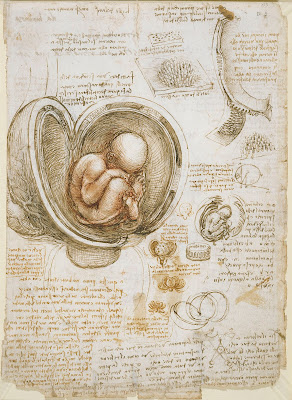Irony and Ian McEwan's 'Nutshell'
In 1502, ‘irony’ received its first mention
in English print. Irony, the anonymous author said, refers to 'grammar by the
which a man says one [thing and] gives to understand the contrary’. As such, irony contrasts appearance with reality, directing our attention to the
level of incongruity between words and their meanings. On a surface level, irony is an attempt to state the very things it does not mean. Irony pursues truth – it usually has a comic effect, noting the absurdity of everyday
things.
In Nutshell, Ian McEwan uses
verbal irony to craft a fictional foetus’s voice. As a first-person narrative,
the novel tells a murder tale through the observations of a nine-month-old baby
still in the womb of its mother. Irony is key to the novel’s
inception, for a talking foetus is an impossibility, let alone imaginable.
Nutshell’s narrative is a discussion of the foetal
condition. The narrator, an autonomous baby, wonders what it feels like to
be human. The novel’s epigraph is from Hamlet, and just as Shakespeare
explores father/son metaphysics in Hamlet’s cast of characters, McEwan
attempts to investigate the everyday conditions that pre-date worldly life. The baby
pleads: ‘Grant me all the agency the human frame can bear, retrieve my young
panther-self of sculpted muscle and long cold store, direct him to the most
extreme measure’ (52). Helplessness is key to the foetal state. Fundamentally,
the foetus is at mercy to the world’s decisions. Without the experience of
causation or action, Nutshell’s foetal narrator can only dream
of being human. This is the extent of its bearing on the world: it can
never act the same way the ‘human frame’ can.
McEwan plays with everyday colloquialisms
to heighten our sense of the foetus’s situation – namely, the desire to be born
and grow into an autonomous human. In the opening paragraph, our narrator
admits that he (it’s a boy) ‘once drifted in my translucent body bag . . . [but]
that was in my careless youth’ (1). Later, he learns of his mother’s plans to
murder his father, but the burden of knowledge combines with the inability act. This torments him. ‘I see no scheme, no plausible route to any conceivable
happiness. I wish never to be born’ (75). Such commentary inverts humanity’s
dilemmas and remixes them, addressing the problems of pre-birth. Irony makes the
foetus’s voice believable – as controversial as this may be, ironic language makes
the foetus human.
For the most part, the use of such
techniques allows McEwan’s speculative fiction to work. Unfortunately, he also manages
to break the spell and destroys the reader’s confidence in the story.
Nutshell suffers from pretension. In a key
passage, the foetus reveals that his mother is a functioning alcoholic.
Resultantly, the foetus indulges in high-flown critiques of the wines she
drinks, sounding more like a restaurant critic than an unborn child.
Trudy and I are getting
drunk again [. . .] After a piercing white, a Pinot Noir is a mother’s soothing
hand. Oh, to be alive while such a grape exists! A blossom, a bouquet of peace
and reason. No one seems to want to read aloud the label so I’m forced to make
a guess, and hazard an Échezaux Grand Cru. Put . . . a gun to my head to name
the domaine, I would blurt out la Romanée-Counti, for the spicy cassis and
black cherry alone. The hint of violets and fine tannins suggests that lazy,
clement summer of . . . (51)
And so on. McEwan’s personal interests
in wine tasting gets in the way of Nutshell’s story. Such indulgent
episodes reveal the level of middle-class male authorship that infects the
foetus’s fictional world. Although Nutshell does a good job
in telling a gripping tale, it fails to be entirely convincing.
Source:
Nutshell. By Ian McEwan. New York: Doubleday,
2016. 978-0-385-54207-4.
 |
| Studies of the Fetus in the Womb by Leonardo da Vinci, c. 1511 (chalk on paper) Royal Collection, London |


Comments
Post a Comment